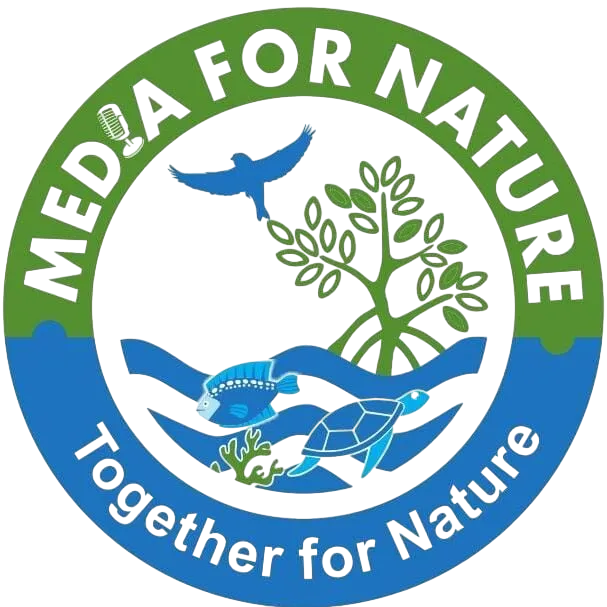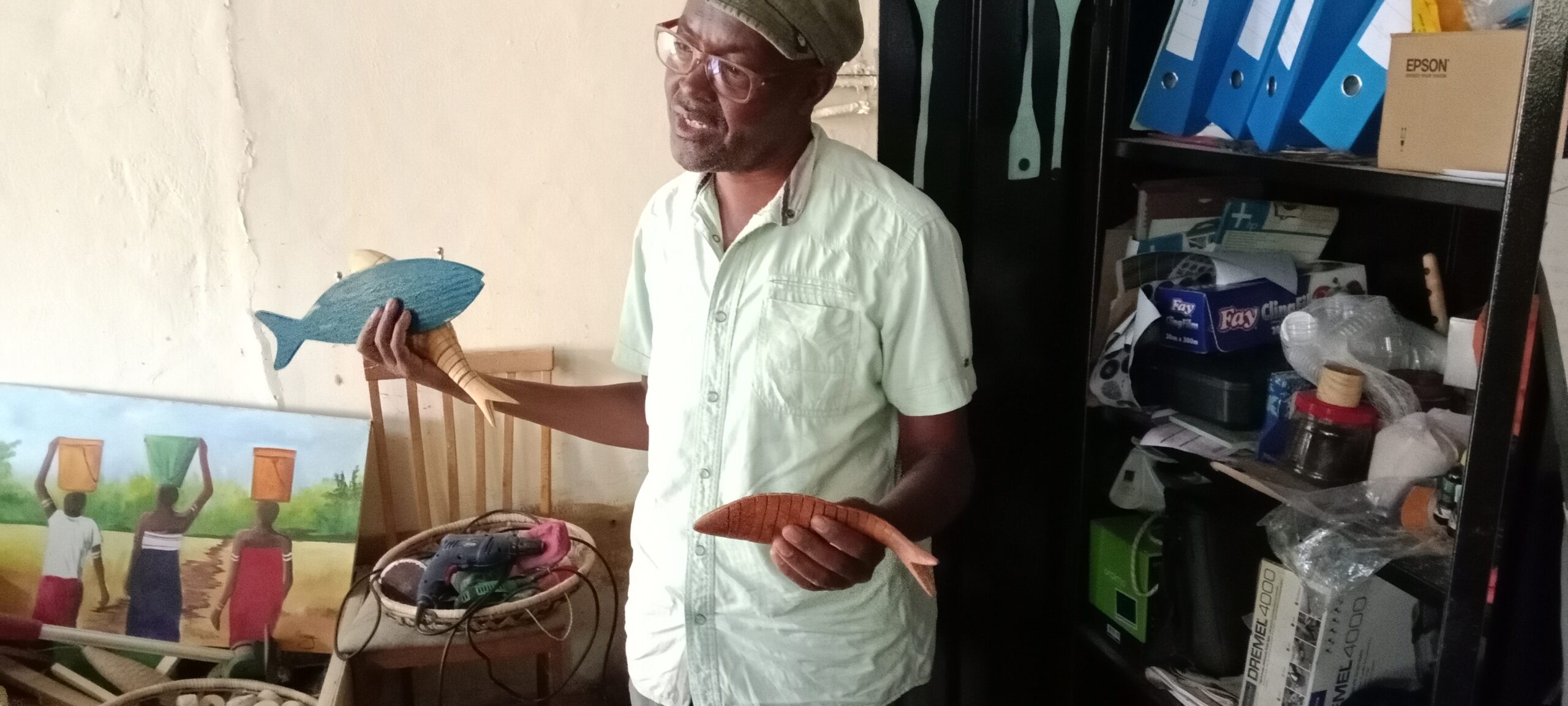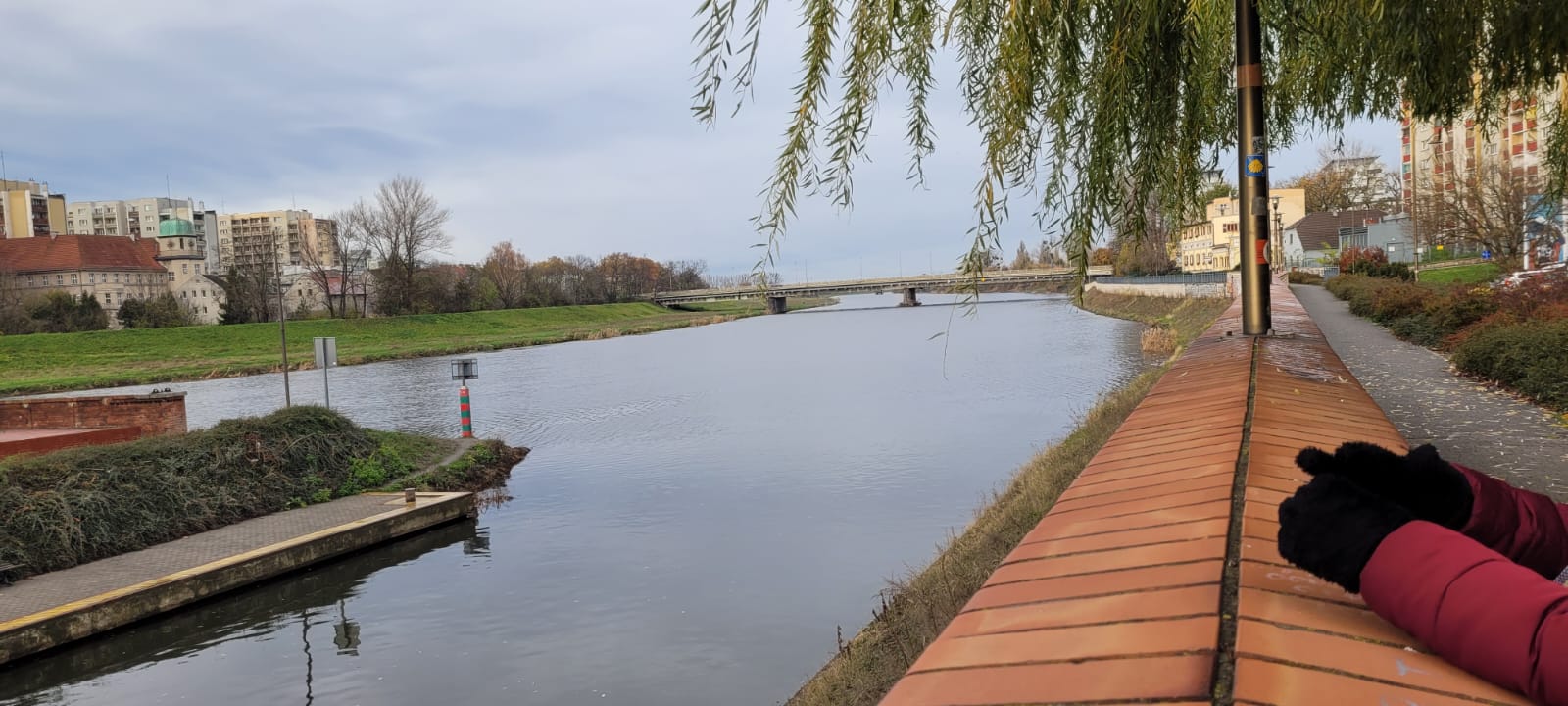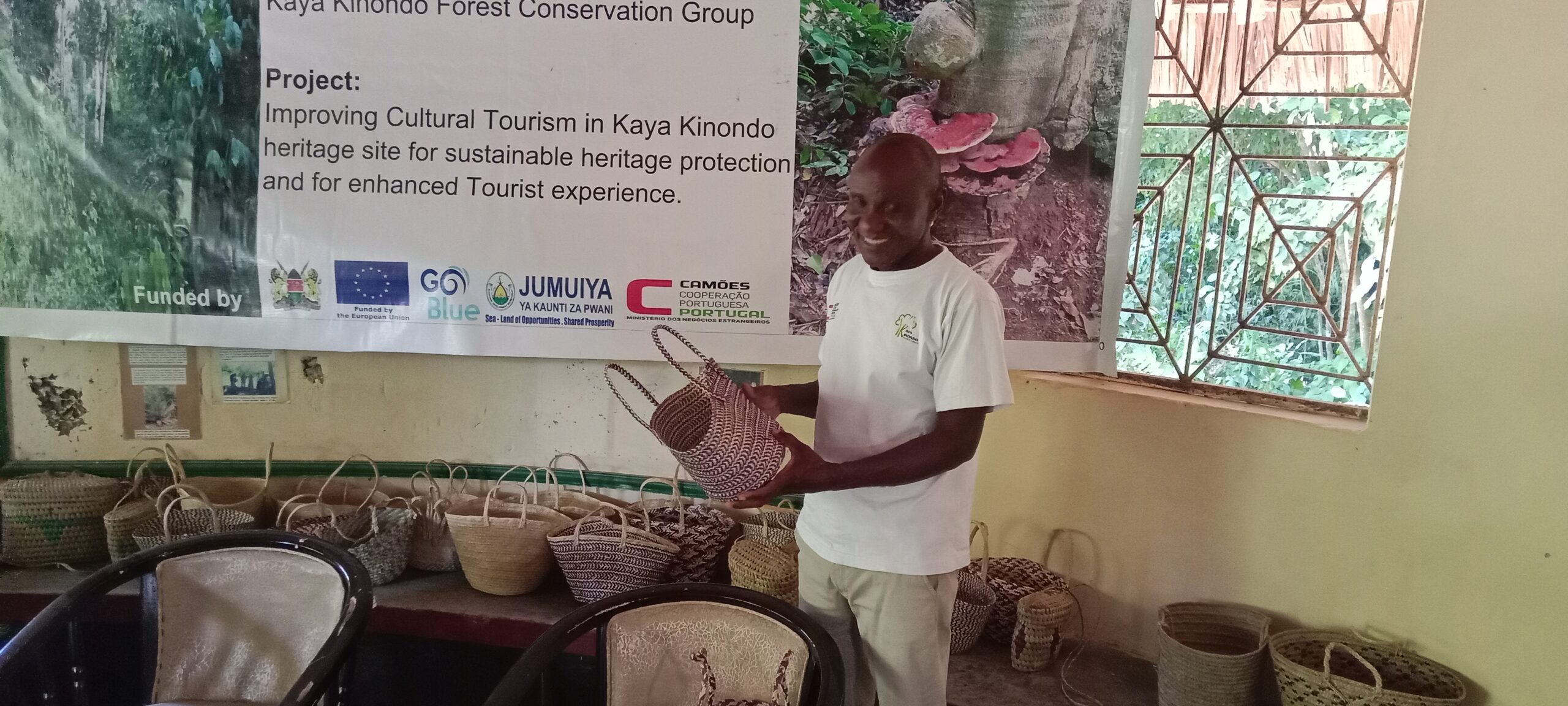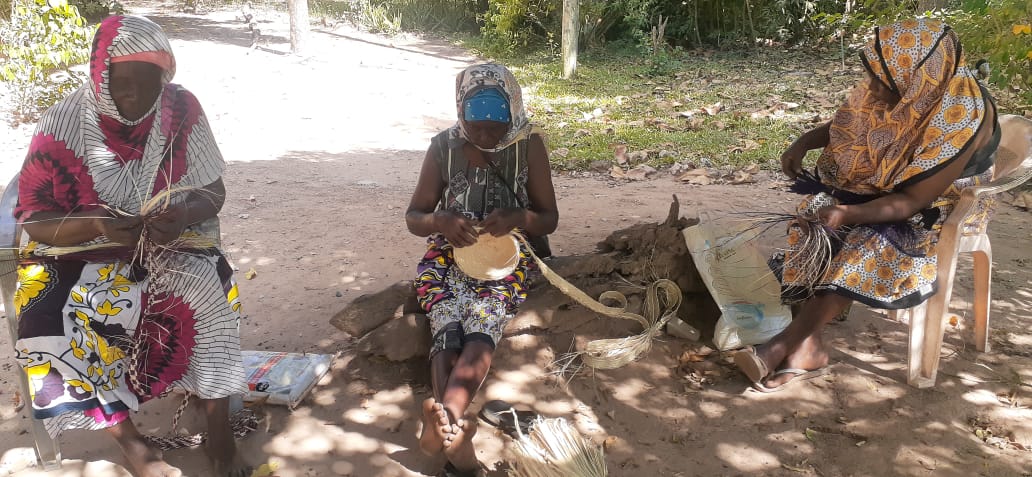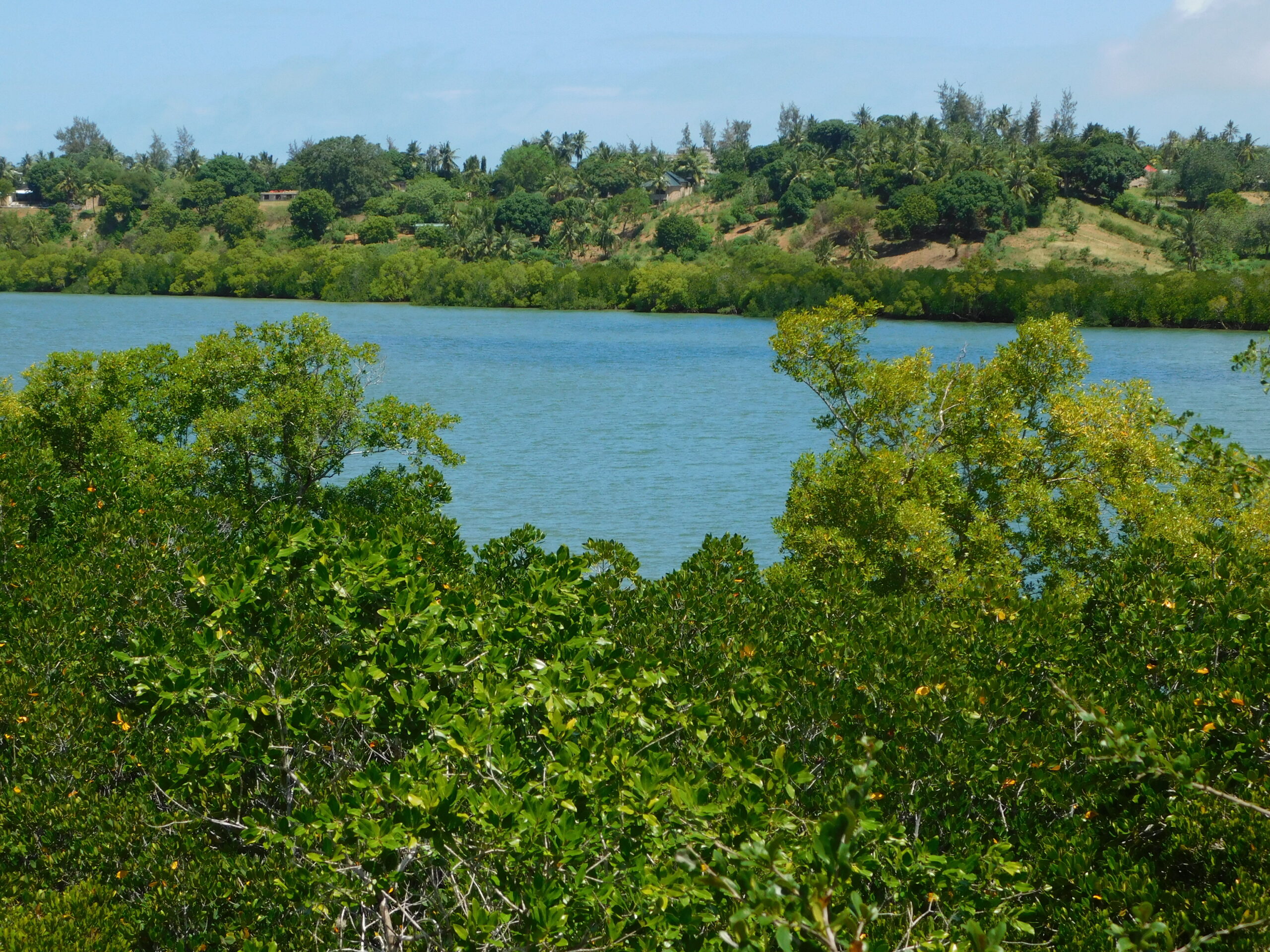Common Interest CEO Julius Musyoka showing off some fish carvings made from his workshop/Photo Mazera Ndurya
There goes the saying that a picture is worth a thousand words, likewise, a simple wooden carving can tell a story of a community’s culture. This is what Julius Musyoka, founder of Common Interest, a beneficiary of small business grants given by Camoes IP, an implementing partner of the Go Blue project, set out to do by combining his design and carving skills to curate the culture of the coastal communities through developing meaningful toys and revitalizing other traditional craft through value addition.
Implemented through collaboration with Jumuiya ya Kaunti za Pwani, the Go Blue Project is an initiative of the Government of Kenya and the European Union to advance coastal development agenda and the blue economy. Designed to touch as many aspects of the Blue economy, tourism is one of the key pillars, with focus on promoting cultural heritage. Julius, and fifteen other small businesses in tourism and cultural heritage benefited from small grants through Camões, I.P., the Portuguese Development Corporation.
Common Interest unique business proposal was designed to promote culture and heritage cultural artefacts which includes and not limited to toy cars, woven items, small furniture, musical instruments, small statues of aquatic and terrestrial creatures as well as coconut art, to promote cultural heritage through the use of materials that are traditionally significant to the communities.
What started as a simple pastime to make his son a wooden toy car, has now shaped Julius Musyoka into an accomplished designer and sculptor of great repute in Kenya.
Musyoka, the founder of the Common Interest organization in Mombasa County, ventured into this trade out of frustration after repeatedly buying toy cars for his son that didn’t last. From a single wooden toy car, it grew into a thriving business making toy cars for children.
“I started with five and hawking them but it soon blossomed and moved from selling in the streets to exhibitions and my first fair was at the Nyali Baptist church and out of the 33 pieces I was able to sell 22 at Ksh1, 000 each and no one complained about the price.
“I was posting the toys on social media but to me it was just a hobby until a friend of mine working in an art shop called me to ask about how I could supply them with my toys and that too became a good market for my products,” said Musyoka.
This was to be his source of livelihood during the Covid-19 pandemic lockdown while working at home.
“It was during that time when someone whom I still don’t know up to now shared a link which was a call for applications for the Go Blue grants. I applied and went through all the stages and got approved.
The grant process was made seamless, because the project was designed to help small businesses. “We signed the grant digitally. A team from Camões, the Portuguese Development Agency came to visit alongside those from the Sustainable Tour and Travel Africa (STTA). They came to the house and I told them that was where I was operating from because I could not afford a workshop space. I displayed all the toys on the sofa set and they were convinced,” he explained.

Common Interest Company is one of the groups in the Kenyan Coast that benefitted from funding amounting to 18,500 Euros provided by Camoes under the GO BLUE project to undertake activities that include developing culture and heritage themed products targeting the youth for educational purposes.
Community art
The uniqueness of proposal by Common Interest was the use of community art to develop practical handcrafts that carried the heritage of the coastal communities. The project focused on Mijikenda and Pokomo communities because of their rich cultures that is ingrained in their way of life.
“My project aim was to develop unique crafts as tourism products, the things that people buy when they come to Mombasa which are inspired by the culture of the people of Mombasa and the coast region.
“When we received the grants from Camoes, we focused on products that we could put to the market quickly and we chose the wooden toy cars, infused with elements of culture, because we already had a market for it,” he said.
To develop other products, the team a Common Interest, undertook research to find what is cultural in terms of artistic presentation. Among many cultural presentations, wooven baskets and khanga (wrappers) were predominant. The next phase of product research involved visiting communities with weaving skills. The Pokomo were prioritized because of their unique weaving and colour combinations.
“We went to Wenje and Vukoni in Tana River County where weaving is the economic mainstay for women and bought their handcrafts that included baskets and mats. The aim was to have samples of the real artwork for further development of design motifs.
“We then focused on Giriama arts, their cultural handcrafts and even clothing. We also identified daily women chores as unique elements of culture and settled on doing paintings of women fetching water among other chores such as grinding grains and food preparations as part of artistic presentations,” he added.
To achieve a balanced representation of culture, their designs were also influenced by life under water, a critical component of the blue economy.
Sustainability
Sustainability is a key part of the Go Blue project. On this, Musyoka’s work took into consideration environmental conservation and that is the reason they used recycled timber or wood instead of using freshly cut trees for wood. On cultural materials, he designed a way of communicating cultural attributes by using stickers.
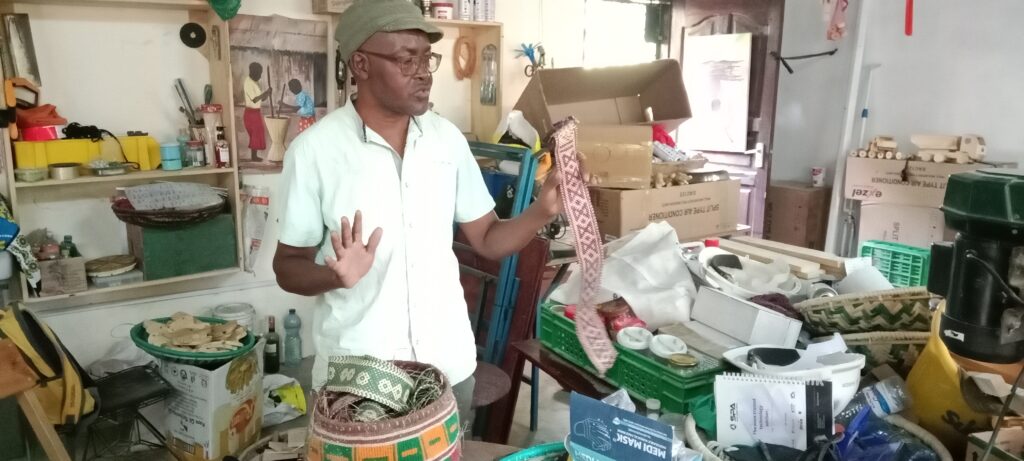
Speaking on inclusivity, he said, “We are also creating more work for the rural women and connecting them to the conventional markets and that’s a good social development.” He added, when….“When I got the opportunity to work with other artisans including people living with disability we developed a generic fish, one that people can identify with, but of course we need to do other species that are common like dolphins, sharks and if possible octopus.
Most importantly, he added, in the past, the toys he made could be used in place of modern ones found in shops, today, his products have been revamped to be used as cultural education materials for children.
Just like Musyoka, whose enterprise has been transformed by small business grants from Go Blue project, in Diani, in Kwale County Members of the Millennium Handcraft Cooperative can now work with ease from a spacious and conducive environment, thanks to funding from the Go Blue project.
Millennium Handcraft Cooperative received sub-grants from the African Pro-Poor Tourism Development Centre (APTDC), a beneficiary of the Go Blue Project.
With a grant of Ksh334,000 from Camões, I.P., the Portuguese Development Corporation, the cooperative has been able to expand the showroom to accommodate more carvings.
Business Grants
Gideon Mutua, Vice chairman Millennium Handcrafts Cooperative said inadequate space for their products was a big challenge as their clients did not have ample space to move around the shop to sample the crafts.
“We went through the grant application process in 2023, and were successful.
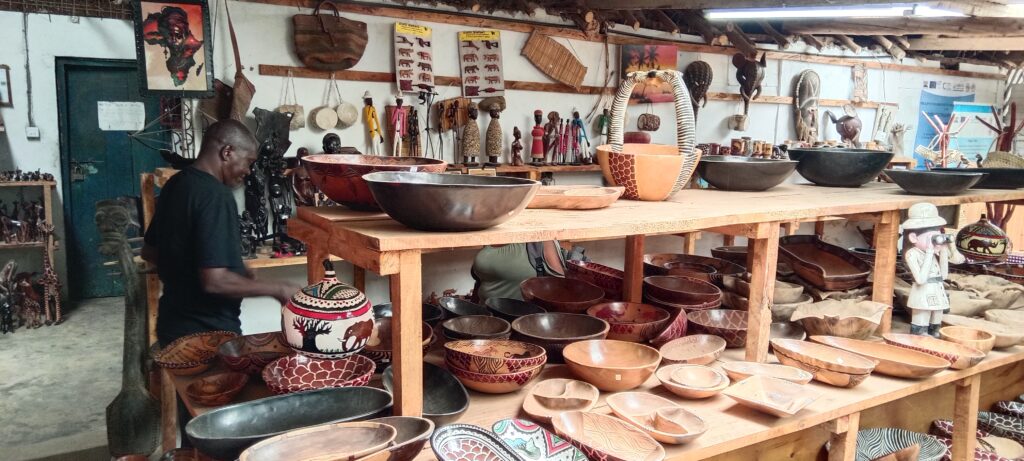
Before the small business grants, the group operated in a small area that they used as a showroom and offices. Today they have a spacious show room that enables them to display more products. They have also acquired a big tent that has transformed the sculptors working space from open sun to shed, increasing productivity
Although they are traditionally carvers of wild animals that are synonymous with the Kenya’s wildlife found in the national parks and reserves, they are saying it is good to diversify to meet the taste and needs of diverse clients.
“At first we were merely concentrating on traditional artefacts such as drums, bows and arrows, traditional walking sticks and clubs, of course the carvings of the animals are our main products here.
The sculptors face some challenges too and one of them is that they must go to the rural areas to source for materials and that means incurring the cost of transporting it to their site.
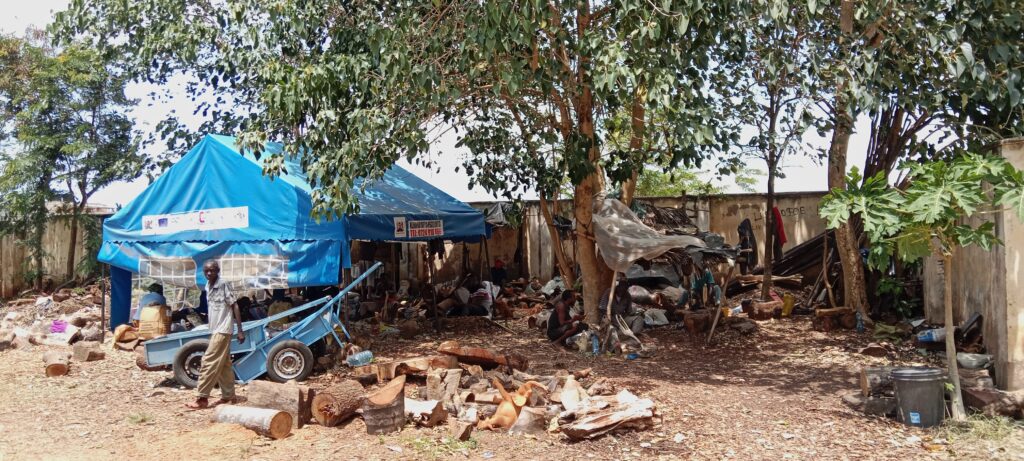
“The business is dependent of tourism therefore when the season is low the sales also go down. However, the members are grateful to the project because through the funding they are finalizing their website which will come in handy in the marketing of their products. Once in place the website will help in the online marketing of their products. This, Mutua said, will help in boosting their sales as most of their foreign clients will be able to buy online and have their products sent either by ship or air.
Impact
At least 16 organizations, in tourism and cultural heritage, from the 6 coastal counties, have received grants through the Go Blue project, to advance tourism and cultural heritage within the blue economy. The amount granted are close to 600,000 Euros. Through the enhanced capacities of the 16 organizations, more than 100 new long-term jobs have been created and hundreds of short term and indirect jobs. Apart from grants, the organizations received mentorship in business development services including skills to develop business plans, marketing plans, monitoring & evaluation plans as well skills in designing impactful communication and visibility plans.
